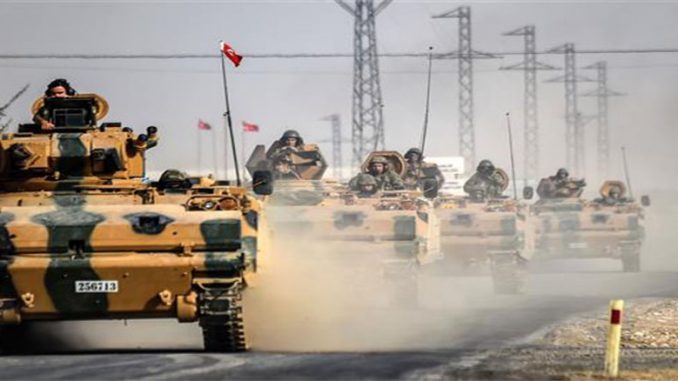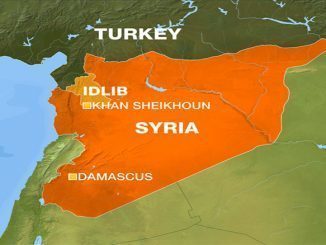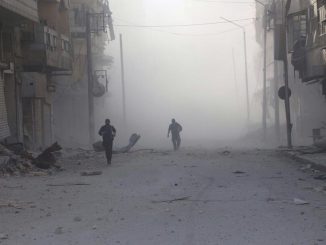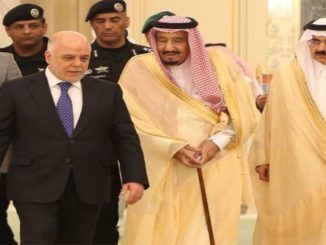
 BY: İbrahim Karagül*
BY: İbrahim Karagül*
It seems that Turkey made its own plan and gave it to the U.S. We currently don’t know what the U.S.’s attitude is. Whatever the answer, the Raqqa operation as well as any other joint intervention in Syria must prioritize Turkey’s security. Every option other than this, a change in the order of priorities, can drag Turkey into a very dangerous future. It can negate all plans aimed at the region. It will lead to disappointments and we will face traumatic losses. It can make greater room for the Kurdistan Workers’ Party’s (PKK) Syrian offshoot Democratic Union Party (PYD) and make that corridor a reality under the name of “safe zone.”
The US must give up its plan to siege Turkey
The fight against Daesh is continuing with hypocrisies and the corridor in question is a plan the U.S. is implementing with terrorist organizations in the region. Will the U.S. give up this plan? Is it going to halt its operation aimed at sieging, closing in on Turkey? Ankara should not be convinced to take part in any joint operation before Washington announces that it has given up this plan.
How will the CIA chief’s visit to Ankara affect the new efforts to get close that started with new U.S. President Donald Trump, Turkey-Russia ties and the cease-fire in Syria? Will it lead to the start of a new freeze with Moscow? Or will it this time lead Russia to play the “PKK card”?
CIA chief in Ankara, Russians strike our soldiers
Just as we were discussing all this, the Russians striking our soldiers by mistake, recalled the example of Turkey’s downing the Russian warplane. Could something like this happening while CIA chief Mike Pompeo was in Ankara be the preliminary preparations of a new kind of “teaming up”?
Could those who brought the two countries to the brink of clashes in the plane crisis by conspiring against Turkey have served the same conspiracy, this time through Russia? Russian President Vladimir Putin calling President Recep Tayyip Erdoğan and offering condolences, saying the attack was made “by mistake,” was a quick intervention in the incident. However, similar to the plane crisis, Russia must also question this incident in depth.
US must promise to end support to PKK/PYD and FETÖ
Let’s continue: How will the new tension policies between the U.S. and Iran affect the ties between Turkey and Iran? Will the U.S. support given to the PKK/PYD, during former U.S. President Barack Obama’s term, end in Trump’s term or will he make such a promise to Turkey? While weapons continue to be transferred to the PKK/PYD, the Trump administration is required to give solid securities to Turkey on this matter. Otherwise, no attempt will be successful, Ankara’s mind will not be put at ease.
What kind of promises will the new U.S. administration make to Turkey concerning the CIA’s role in the July 15 coup attempt – or will it make any promises in this regard? Will Washington, which bred the Gülenist Terror Group (FETÖ) and released it on Turkey and, when the July 15 attempt failed, gathered all FETÖ elements in the U.S. or ally countries and took them under protection, solve the problems of Turkey, in relation to which it is highlighting the “ally” and “strategic partner” emphases once again?
Referendum, terror, front of evil both inside and outside
There are more crucial questions. There is a horrific confidence crisis between Turkey and the U.S. A new approach is in question in the Trump era and of course it is too early to say certain things. The U.S.’s attitude is going to be very closely and very carefully followed by the Turkish public. Because the new security problems faced by Turkey are not classic but existential problems; they have become problems that have the power to directly determine the country’s future.
We are not dealing then with classic terrorism, but dealing with states that are hiding behind terrorism. We are not fighting the PKK and Daesh, but the states that control them. We are dealing with known terrorist organizations, unknown structures, influence circles, economic crisis scenarios and plots aimed at achieving a “no” majority vote in the upcoming referendum.
The resistance on the inside as well as the harsh winds blowing from outside and surroundings are all controlled by the same centers. Like the PKK and Daesh, the objections presented through pro-EU discourse are also under the control of the same centers. We are in a strange period in which organizations that use violence and moderate political discourses can meet at the same common denominator.
No hesitation, no uneasiness, no vexation, no complaining
There is extraordinary aggressiveness, solidarity and alliance to stop Turkey’s great walk, to re-confine it within its borders, to take it hostage, make it dependent on alliance relations once more and, as a matter of fact, to surrender it to the thunderstorms wreaking havoc in the region.
How will these deadly matters, the big change our country is making within and its struggle to re-establish, the West-backed efforts from the region to stifle the change run from now on?
This is what we need to focus on and fight for. Stopping and surrendering would be the end of our country. It would mean Turkey’s turning into Syria, turning into Iraq, those obvious map drafts including Turkey as well. This is why the struggle is big. There is no room for hesitation, uneasiness, vexation or complaints.
Don’t you dare forget the shocking lessons on July 15
We overcame a shock like the July 15 coup attempt. Normally, it was a more critical experience than all words, discourses and theories. Yet, it seems the lesson still wasn’t learned; minds continue to be blurred with pre-July 15 ambiguities. There are still petty plans and efforts to play games through gang fights. We need to speak to these great truths and act upon these lessons we learned in our internal affairs, in Turkish-American ties, in our relations with the EU and in our view of Russia and the region.
Al-Bab is the most important geopolitical move after Cyprus
The al-Bab operation is a historical outburst aimed at negating the map plan trying to be formed in northern Syria and made to completely siege and close in on Turkey. It is Turkey’s biggest geopolitical move after the Cyprus intervention. It is to save the future of our country, to secure its integrity.
It should not be perceived merely like a fight against terrorism, because it isn’t. Both the corridor and Turkey’s intervention is a plan much beyond the fight against terror. Because the “corridor project” does not belong to terrorist organizations; it is the states’ project. It is neither ethnic nor sectarian; it is completely a power struggle.
It is the showdown of the states there, not organizations. This showdown is related to regional and global power maps, the reformation of the region, the re-drawing of borders, the division of some countries and plans to build new states.
Tutelage in Turkey, tutelage in the US
Of course ties with the U.S. need to be improved. Of course the deep rift in trust created in the Obama period needs to be fixed. Of course the alliance relations between Turkey and the U.S., as well as NATO, need to be repaired. However, the sharp separation between the east and west needs to be carefully watched, the harms of this separation need to be avoided as much as possible, Turkey must not be condemned to unilaterally dependent relationships once again, and the area of movement needs to be fully expanded in the vacuum created by this separation.
Trump’s arrival deeply shook global policies. It’s true, his standing against the tutelage groups within the U.S., global-scale tutelage circles gave hope. Can it be compared with Turkey’s fight against tutelage? Time will tell. However, there is one danger. If Turkey’s theories turn into NATO/U.S. theories with the Raqqa operation, the risk to fall into a trap one more time may arise.
If the U.S. administration does not make promises regarding the FETÖ matter, if it does not make any efforts to wipe out the traces of July 15, if it does not cooperate with Turkey in this regard, if they do not give up their plan to siege Turkey through them, we will see more July 15s, face a new wave of terrorism and be held subject to new scenarios aimed at overthrowing the government.
They will take the war all the way into Anatolia
Ruining Turkey and Russia’s ties, distancing the two countries from one another, dragging them into a conflict atmosphere with Iran may lead to grave results. If you remember, this was the aim in downing the Russian plane. FETÖ’s entire struggle was to get Turkey and Iran to clash. July 15 was not only a plan to topple the government, but also to confine Turkey into the U.S. axis and prepare for the opposite front.
This scenario, played out through FETÖ, through the PKK/PYD, might this time be played out within the context of Turkey and the U.S.’s rapprochement. If they succeed at this, there will be no al-Bab, no Jarablus and no Syria cease-fire left. The corridor will also become a reality, Turkey’s plans for the future will go down the drain, thick walls will be built between Turkey and the Arab world, terrorism will start to appear not in Silopi, a southeastern district in Şırnak province, but in central Anatolia.
We have confidence in this political mind
However, we believe that all this will be overcome, the toning down of relations will not lead to a new kind of dependency all over again, that in the showdown of multidimensional power, Turkey is going to use its areas of maneuver well. We share our concerns but we also have confidence in the political mind. Turkey, which has been continuing on its path, overcoming all obstacles, will overcomes these as well.
Lastly, rapport with the U.S. again may cause a deep rift in regional ties. While Trump’s arrival is shaking global policies, it will show the most striking effect in our region.
Turkey and Russia should be prevented from falling apart again. Yesterday’s attack has increased our concerns regarding this matter. After understanding what kind of plan was behind the downing of the Russian plan, are we not right?
*Ibrahim Karagül is a Turkish writer and journalist. He is the editor-in-chief of Turkish Yeni Şafak newspaper.
(Published in Yeni Şafak Turkish newspaper on Feb. 10, 2017)



